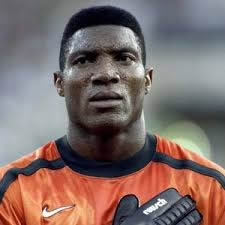The recent passing of Peter Rufai, Nigeria’s iconic goalkeeper, has ignited a firestorm of criticism directed at the Federal Government and the Nigeria Football Federation (NFF). Rufai, affectionately known as “Dodo Mayana,” died at the age of 61 after a brief illness, leaving behind a legacy of remarkable achievements on the football pitch. While his death is a significant loss to the sporting world, it has also brought to the fore a long-simmering issue: the alleged neglect and inadequate support provided to Nigeria’s sporting heroes, particularly after their retirement. The outpouring of grief has quickly morphed into a national conversation about the country’s responsibility to those who have brought it honor and recognition on the global stage.
Former players and public figures have voiced their discontent, expressing frustration at the perceived systemic disregard for the well-being of these athletes. Etim Esin, a former Super Eagles teammate, questioned the government’s inability to provide adequate medical assistance to Rufai during his illness, highlighting the tragic irony of celebrating individuals only after their demise. This sentiment resonates deeply within the Nigerian sporting community, where numerous stories circulate about former athletes struggling with financial hardship and health issues, often without the necessary support systems to navigate these challenges. The question remains: why does a nation that reaps the benefits of their triumphs seemingly abandon its heroes in their times of need?
Adding to the chorus of criticism, comedian Bovi Ugboma lamented the pattern of neglect suffered by Nigerian football icons. He pointed to the delayed delivery of houses promised to the 1994 World Cup squad – a promise fulfilled only after three decades – as a stark example of this systemic disregard. Ugboma’s remarks underscore a larger societal issue of unfulfilled promises and the lack of tangible recognition for the sacrifices made by these athletes. The delayed housing allocation serves as a potent symbol of a broken system that fails to honor its commitments to those who have dedicated their lives to representing the nation. This perceived indifference towards their welfare has sparked a national debate about the values and priorities of a nation that appears to forget its heroes too easily.
Rufai’s family, in their official statement announcing his passing, described his death as an “irreplaceable loss,” highlighting his journey from humble beginnings with Sharks Football Club in Port Harcourt to becoming Nigeria’s first FIFA World Cup goalkeeper. His participation in two World Cups (USA ’94 and France ’98), four Africa Cup of Nations (AFCON) finals, and his pivotal role in Nigeria’s AFCON victory in Tunisia ’94 cemented his status as a Nigerian football legend. The family’s statement paints a picture of a dedicated athlete who rose through the ranks to achieve greatness, representing Nigeria with pride and distinction. His career, spanning several decades and continents, is a testament to his talent and dedication, further fueling the public outcry over the perceived lack of appreciation shown by the authorities.
Tributes poured in from across the globe, including from FIFA President Gianni Infantino, who acknowledged Rufai’s significant contributions to Nigerian and world football. Such international recognition further emphasizes the stature of Rufai within the footballing world and underscores the magnitude of the loss felt not just in Nigeria but internationally. This global outpouring of respect contrasts sharply with the alleged neglect he experienced in his home country, further highlighting the disconnect between the international acclaim he received and the apparent lack of support from his own nation.
Beyond his national team exploits, Rufai’s club career took him to Benin Republic, Belgium, the Netherlands, Portugal, and Spain, showcasing his talent and earning him widespread admiration. After retiring from professional football, he dedicated himself to youth development through his Staruf Sports Development Limited, nurturing young athletes and promoting grassroots sports. This commitment to nurturing the next generation of footballers demonstrates Rufai’s enduring passion for the sport and his desire to give back to the community. His post-playing career further solidifies his legacy as not just a remarkable player but also a dedicated mentor and a champion for youth development in Nigerian sports. The current controversy, therefore, transcends the individual case of Peter Rufai and highlights a systemic issue that requires urgent attention. The debate sparked by his death serves as a wake-up call for the Nigerian government and sporting authorities to re-evaluate their treatment of past and present athletes, ensuring that they receive the recognition, respect, and support they deserve. The calls for better welfare packages and healthcare support for retired athletes are growing louder, demanding a system that values and honors the contributions of its sporting heroes, not just in their moments of glory but throughout their lives.


